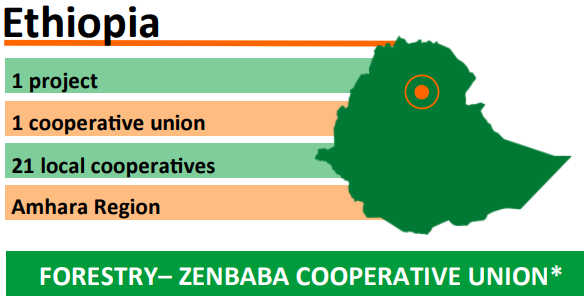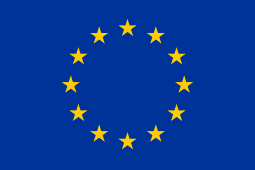Our projects- Africa
July 2018 – December 2020
The expected outcome of the project is “Improved service delivery of Zenbaba Cooperative Union and capacities of its members in sustainable forest management and forest value chain development”. The project supports both Zenbaba Union and its primary cooperatives to increase their income by participating in forest products marketing and forest management activities.
The aim is to improve livelihoods of farmers and reduce poverty. In 2019, the main thrust of work supporting the cooperatives was on business development, forest value chain development and institutional development activities. Marketed products include poles, charcoal, honey and tree seedlings.
Twinning partner: Forest Management Association Central Finland
Project funded by:
June 2019-June 2021
AKA is the Mozambican partner for the project ‘Enhanced livelihoods and value chains for farmers’ organizations in Mozambique and Tanzania’.
AKA operates in the province of Zambezia and is a secondary cooperative union formed by 11 cooperatives. AKA seeks a stronger market position and aims to provide its members with opportunities to use better cultivation techniques and more efficient production planning tools. The main products are corn, beans, peanuts and sesame seeds.
The project aims at improved and resilient livelihoods of Farmer Organizations’ members in Mocuba. This is achieved through improved service delivery of AKA and capacities of its members in climate-smart agricultural production and value chain development.
The project area suffered heavily from the tropical cyclone Idai in March 2019. This led into revision of the project plan with an emphasis in supporting the farmers in recovering from crop loss and other damage caused by the cyclone. Since the yield of the previous year was already poor and practically the whole yield of 2019 was lost, the activities have focused on getting some income to the AKA members to allow them to continue farming.
Twinning partners:
Central Union of Swedish-Speaking Agricultural Producers in Finland (SLC)
Project funded by:
* Aniwanana Kanvanhiana.
*** 158 ha only in 2019, the total number is 281 ha.
July 2019- June 2021
We have supported potato producers in the Southern Highlands since 2015. As a result, the quality of seed potatoes has improved, the farmers have adopted climate-smart potato cultivation methods and a quality system for seed potato production has been developed. Our partner NADO has become a well-networked FO in the potato sector in the region (Tanzania and Uganda), applies a seed potato quality system and negotiates contracts on behalf of its members.
Currently, NADO is the Tanzanian partner for the project ‘Enhanced livelihoods and value chains for farmers’ organizations in Mozambique and Tanzania’.
The project aims at improved and resilient livelihoods of Farmer Organizations’ members in Njombe Region. This will be achieved by improved service delivery of NADO and capacities of its members in climate-smart agricultural production and value chain development.
In 2019 the focus of the new project was on enhancing NADO and its members capacity in climate change adaptation and mitigation, and deepening the farmers’ knowledge and adoption of Good Agricultural Practices (GAP) particularly with the aim of ensuring high potato quality through quality verification and subsequent quality certification. Better potato quality contributes to increased yields.
A RURAL STORY: GROWING POTATOES, GROWING OPPORTUNITIES
The Faidika Farmer’s group in Kanani Village used to sell their potato harvest individually incurring high costs and being overpowered when negotiating with buyers. Today, they are organized, stronger and skilled, which gives them a stronger position in negotiations. The Kanani Village group is one of the groups who are involved in FFD’s project supporting Njombe Agricultural Development Organization in Njombe Region.
The combination of improved seeds, training in Good Agricultural Practices and reduction in post-harvest losses due to improved storage techniques and storage infrastructures provided farmers with higher potato quality. In addition, proper potato grading, collective marketing and networking strategies provided regular buyers, more revenues and reduced costs.
“ “After harvesting, we find a buyer together and collect our potatoes in the centres. Our transportation costs have decreased because we share costs. Everyone contributes 10,000 TSHs. When we used to sell individually, each farmer paid 200,000 TSHs alone. Our profits have also increased because we sell potatoes direct to buyers at a price of 5000TSHs/TIN. We have more profit than when selling to middlemen at a price of 4000 TSHs/ TIN” ”
Twinning partner: ProAgria Southern Ostrobothnia
Project funded by:
May 2018-February 2020
The project implemented by UWAMIMA aims to increase smallholder tree grower’s income by selling their timber and other forest products through a Market Center. Furthermore, it aims to increase the number of smallholder tree growers selling their timber collectively through the Market Center.
During 2019, project activities continued developing timber and timber products value chain and promoting income generating activities. The main focus of the project was on operationalization of the Market Center, originally established in a previous project phase. This included e.g. equipping the Center with basic office equipment, training the board and staff on business management, and maintaining surrounding road networks for ease of transport of the timber. Member farmers were trained on woodlot data management as well as production and income diversification through fruit tree cultivation.
A climate workshop was organized with 20 participants (10 men and 10 women); during the workshop the Resilience Tool was piloted and feedback collected for its further development. The tool demonstrated its value to empower farmers to understand how climate change is impacting lives and furthermore, their possibilities to fight back and become climate actors.
Twinning partner: FMA Päijät-Häme
The part of the project implemented by Tanzania Tree Growers Association Union—TTGAU aims to spur a common Tanzania tree growers’ voice to address forestry and related value chain issues with the aim of enhancing inclusiveness, competitiveness and resilience of the sector.
In 2019, the focus was on increasing the visibility of TTGAU among members and sector stakeholders and to increase the membership, smallholder forestry inclusion and simplified levy and permit system for timber trade recognized by the Tanzanian Government.
TTGAU has solidified its position as a genuine representative of small-scale tree growers in the national networks and has made its first commercial tree growing contract on behalf of its members. In 2019, TTGAU became member of International Family Forest Alliance (IFFA) and the Tanzania Forestry Working Group (FWG).
Twinning partner: Central Union of Agricultural Producers and Forest Owners of Finland
Project funded by:
July 2018-December 2020
The project is implemented in Zanzibar where the cooperation started in 2014. The project aims to improved service delivery of TAHA and capacities of its members in horticulture value chain development and improved production, processing and marketing thereby contributing to improved livelihoods of farmers.
The support focused on quality assurance and the development of a quality system. The aim is to diversify crops, promote the use of vegetables and pave the way for processing, as the increased production has caused an oversupply of tomatoes, peppers and watermelons.
Horticultural extension services remain at the heart of the project with TAHA providing a lot of training and advice on climate-smart farming practices, crop production and quality, and marketing. TAHA is currently developing the Local GAP (Good Agricultural Practices) quality system, to be piloted in Zanzibar.
TAHA is becoming one of the key actors in increasing Zanzibar´s food self-sufficiency through its contribution to decision-making and advocacy in addition to increased quality and yields of horticultural products.
The success is based on TAHA´s competent staff and operational capacity. In 2019, five women were promoted to managerial positions. Furthermore, the application of Good Agricultural Practices (853 ha) and investments in drip irrigation and greenhouses has brought more than 50% increase in sales, 40% in yields and 57% in income. Hotels are realizing the good quality of local product and sales agreements are increasing.
Twinning partner: Finnish Garden Women Association
Project funded by:
December 2019 - June 2023
The ‘Value for Water’ project promotes environmentally friendly access to water for horticultural farmers through a business model that reduces risks related to irrigation investments. The concept aims at testing modern applications to optimize water usage and modalities for corporate structure, financial flows, and operational model aiming at creating a social entrepreneurial initiative. The recently started project aims to establish a business entity for social water management. Through implementation of the project, farmers will be able to increase their crop yields and quality, and hence increase access to profitable markets. TAHA as an FO will establish a business entity that will strengthen the financial sustainability of the organization.
The project has three expected outcomes: 1) TAHA improves technical and economic services along the fruits & vegetables value chain, 2) TAHA influences policies and business environment for the development of sustainable farmer-led enterprises, and 3) TAHA is an accountable organization able to effectively perform its institutional functions.
2020 was the first year of field implementation in the Value for Water project. In the beginning of the year, a consultant-supported survey was conducted in the project area to introduce the project to key stakeholders, identify the requirements to establish a commercial irrigation water scheme, scan for experiences in the region, and based on these, to establish the way forward for actual work on the ground.
The Covid-19 pandemic interrupted field work completely in March-April and the horticulture value chain experienced severe challenges as flights for commercial exports were cancelled, borders to Kenya were closed and key export markets faced lockdowns. Freight charges were considerably increased while demand for products declined in many markets. In a rapid Covid-response facilitated by project funding TAHA through its subsidiary TAHAFresh Handling Ltd addressed several logistics challenges to help members / customers sustain their businesses, secure employment and maintain their customers in the EU market. With 60 000 EUR emergency response funding from the project, the following were achieved:
Horticultural crops of over USD 8,2 million in export value were rescued
A total of 4 647 full time employment was secured, 65% of which women
TAHA managed to negotiate a reduced freight rate from USD 6,25/kg to USD 2,25/kg
Some of the exporters who ceased operations in April due to freight challenges resumed operations in May with a surge in export volumes
European buyers increased orders of Tanzanian produce by 30% because they could not access supplies from countries like Uganda and Rwanda due to freight challenges
Landing permit duration for cargo aircraft was increased from one week to 3 months
In the second half of the year, activities slowly resumed and a total of 60 farmers were identified and mobilized to form Water user Groups (WUGs) within the project. 40 farmers were trained on Good Agricultural Practices (GAPs) and solar powered irrigation. The farmers knowledge on GAPs relating to irrigation was enhanced for them to be able to irrigate their farmland sustainably, increase production, and invest funds saved on the purchase of diesel and electricity token in more efficient technologies like solar. The awareness of 48 farmers increased on the pay-as-you-go irrigation model. Farmers were encouraged to plan for and become more economical in the use of irrigation water.
In an awareness campaign on climate change an estimated 50 000 farmers were reached through radio channel Moshi FM in Kilimanjaro region. The radio program focused on general farming practices in the area and their impact on the environment. Related climate issues included increased heat, drought, insect outbreaks, declining water supplies, and reduced agricultural yields. Feedback from the Moshi FM media during the campaign showed that almost 60% of the audience have been unaware of the impact of farming activities to environment.
Twinning partner: Finnish Garden Women Association
Project funded by:
FO4ACP is co-financed by the European Union with the technical support of the International Fund For Agricultural Development.
January 2020-2023
‘Sustainable and profitable smallholder Forestry in Kenya’ project aims to contribute to the vibrant and resilient domestic forestry and economic development through strengthening smallholders’ organization, increasing smallholder´s capacity to manage productive forests and agroforestry assets, and to facilitate farm forestry-based entrepreneurship.
Sustainable and resilient smallholder plantation forestry for income generation and livelihood improvement in rural areas will be achieved through improved services of Farm Forestry Smallholder Producers Association of Kenya (FF-SPAK) to its members. Furthermore, the project aims to foment cooperation between farmer’s organization in the region in order to activate policy discussion and innovation related to smallholder relevant forest certification, and to capture good practices for inclusion of smallholders to sustainable forest management programmes and forest certification schemes.
The project was implemented by FF-SPAK and its member associations in Muranga and Kiambu and reaching close to 2300 producers in 2020, of which around 50 % were women, 117 youth and 19 persons with disability.
The project achievements included enhanced service provision to farmers by means of developing a pool of training of trainers (ToT’s)/promoters in different fields including financial services, business development, silviculture and cooperative management. In addition, the project engaged actively extension to support different activities, including experts from the Department of Cooperatives, Ministry of Agriculture, export companies and Kenya Forest service to provide advisory. Strengthening local advisory is sustainable as it is cost effective and makes services/support to farmers available on demand.
The two target cooperatives business development has advanced, as the cooperatives have improved structures to support business (especially in management and finance) and two business plans been developed providing a road map for the 2 cooperatives for business development for selling fruits. Already, the cooperatives are doing collective marketing where they sold a combined total of 164,275 Kgs of avocados earning KES 12,230, 677 or 113,247 USD. In addition, the target cooperatives now have fully functioning offices with digital record keeping as a result of the equipment’s provided by the project including computers and printers. This has enabled the cooperatives store their records better and make services to members faster and easier.
The training on Village savings and loaning associations (VSLA) resulted in 3 VSLA groups being already formed while several others are being organized by the promoters. The total membership of the groups is currently 47 members. Out of this 27 are women and 20 are male. The active participation of women is linked to FF-SPAK emphasis on women empowerment in the VSLA trainings.
FF-SPAK knowledge base in nursery and forest certification was built in 2020 by a consultancy report of AES, a virtual workshop with MTK and the knowledge exchange between Kenya, South Africa and Finland. The new know-how is very beneficial to members of the FO’s and FF-SPAK at large as it provides the needed support for planning further action in terms of certification development and advocacy, and gives FF-SPAK advantage to take part in working groups with the other actors of the sector.
The capacity of the project FOs has enhanced through investments in office facilities, finance management and leadership skills. At the cooperative level this has meant ability to create structures and processes for business management including digital record keeping. Also, the apex organization FF-SPAK has developed project organization and administrational tasks to be more efficient, thus spearing more time for implementation. The project has now a well-defined management structure consisting of a project coordinator, programme officers, grassroot mobilizers and specialist extension officers attached to target FO’s field coordinators. Personnel in the field as well as virtual meetings and remote monitoring has enabled organizing activities and provide reports/feedback to the office despite the Covid-pandemic. Overall, about 80% of planned activities were implemented and good progress made towards attainment of set objectives. In addition, the project was able to safeguard the health of project beneficiaries and implementers during the Covid-pandemic with additional food security and hygiene activities.
During the reporting period, the project supported members of the 2 cooperatives to protect their members and communities against Covid-19. While collection centers and offices/public spaces were supported with hand washing facilities, sanitizers and PPE’s. The project also identified vulnerable people including the very poor who received masks and sanitizers to ease the burden of buying them.
Also, the Covid-specific intervention included the promotion of multi-storied kitchen gardens that to help household mitigate against food shortage caused by the Covid-restrictions. A total of 45 households were supported by this initiative majority of whom were from vulnerable communities- I.e. the very poor, ethnic minorities who depend on casual labor for income.
Twinning partner: Forest Services of the Central Union of Agricultural Producers and Forest Owners of Finland (MTK)
Project funded by:
FO4ACP is co-financed by the European Union with the technical support of the International Fund For Agricultural Development.

























































